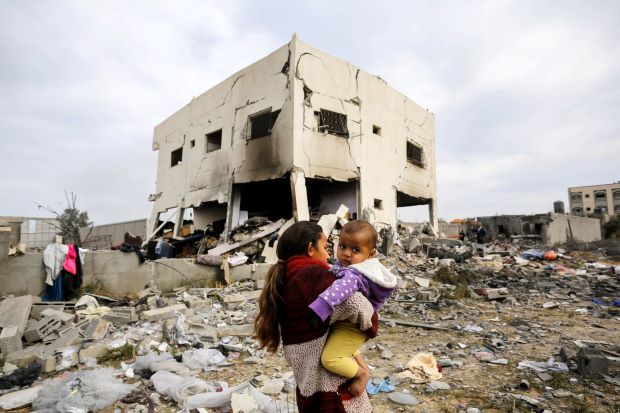US calls for immediate Gaza ceasefire and hostage deal in draft UN resolution
Source says wording suggests significant movement in US position as pressure mounts on Israel to halt campaign
By Julian Borger and Peter Beaumont
WASHINGTON /LONDON – The US has drafted a new UN Security Council resolution calling for an “immediate ceasefire” and hostage deal in Gaza, amid mounting pressure on Israel to halt its military campaign and allow the delivery of substantial amounts of humanitarian aid into the Palestinian territory.
The secretary of state, Antony Blinken, presented the resolution as calling for “an immediate ceasefire tied to the release of hostages”.
The US has consistently argued that the route to a ceasefire has to be through a hostage deal, but the new draft resolution presented on Thursday (21), seen by the Guardian, is more ambiguous about the linkage.
The draft says the UN Security Council “determines the imperative of an immediate and sustained ceasefire to protect civilians on all sides, allow for the delivery of essential humanitarian assistance, and alleviate humanitarian suffering, and towards that end unequivocally supports ongoing international diplomatic efforts to secure such a ceasefire in connection with the release of all remaining hostages”.
A European diplomat at the UN said the stress on an “immediate” ceasefire and the phrase “towards that end” showed significant movement in the US position. “I think it is a shift in saying that a ceasefire is not contingent on a specific deal,” the diplomat said.
The shift in wording brings the US closer to its European and Middle Eastern allies who are pressing for a ceasefire before a hostage deal if necessary, and appears designed to attract the widest possible support at the UN. It also increases the pressure on the Israeli government, which has been insisting it will carry out a new offensive on the southern Gaza city of Rafah, in the face of strong US objections.
Talks on a ceasefire and hostage deal resumed in Qatar this week, aimed at closing remaining gaps between Israel and Hamas positions. Israel rejected a Hamas proposal for hostage release in exchange for an agreement that would end the war. Israel is focused on a temporary pause, in which 40 particularly vulnerable hostages, elderly and sick people and some women, would be freed for a six-week cessation of hostilities.
“I think the gaps are narrowing, and I think an agreement is very much possible,” Blinken told the Saudi news channel Al Hadath. “The Israeli team is present, and has the authority to reach an agreement.”
The pressure on the US to change its position on a ceasefire increased this week with the declaration of imminent famine in parts of Gaza by a UN panel of experts.
The US draft resolution is unusually detailed, containing 26 operative paragraphs, stressing the demand for “the immediate, safe, sustained and unhindered delivery of humanitarian assistance at scale directly to the Palestinian civilian population throughout the Gaza Strip”.
Details of the draft resolution were revealed as the UN released an analysis of satellite imagery showing that 35% of buildings in Gaza had been damaged or destroyed during Israel’s offensive, which has claimed almost 32,000 Palestinian lives.
The US has vetoed previous UN Security Council votes on the nearly six-month-long war, objecting as recently as in February to the use of the term “immediate” in a draft submitted by Algeria. In recent weeks, however, Washington has upped the pressure on its ally while insisting Hamas militants must immediately release the hostages seized during its 7 October attacks on Israel.
US officials had been negotiating an alternative text since blocking the Algerian draft resolution calling for an “immediate humanitarian ceasefire” in Gaza at the end of February. That alternative, focusing on support for a six-week truce in exchange for the release of hostages, had little chance of winning approval, according to diplomatic sources.
While no vote has yet been scheduled on the new text, it sends the clearest message yet to Israel of the Biden administration’s growing frustration with its prosecution of the war, and comes after a warning from the UN human rights chief, Volker Türk, that Israel may be committing a war crime by using “starvation as a method of war”.
Officials from 36 countries and UN agencies gathered in Cyprus on Thursday to discuss how to expedite aid to besieged Palestinians in Gaza via a sea route launched last week. The gathering is being attended by Sigrid Kaag, the UN’s senior humanitarian and reconstruction coordinator for Gaza, as well as Curtis Ried, the chief of staff of the US National Security Council.
Under an agreement hammered out with Israel, cargoes can undergo security inspections in Cyprus by a team including Israeli personnel, eliminating the need for screenings at its final offloading point to remove potential hold-ups in aid deliveries.
One vessel left Cyprus last week and distributed aid in Gaza, while another two are expected to depart in the coming days, subject to weather conditions.
Constantinos Kombos, Cyprus’s foreign minister, said: “We are discussing how we can max up operational capacity both in terms of departure and means of transport and also in relation to the reception and distribution methodology.”
Delegates would also discuss the creation of a fund to coordinate operational activities of the initiative, Kombos said, although he clarified it was not a donors’ conference.
-theguardian.com



Comments are closed, but trackbacks and pingbacks are open.